2021 Intersectional Justice Discussion Group Instructors
Marcus Anthony Brock 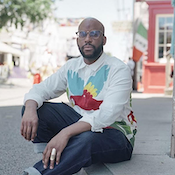
Marcus is a writer, a teacher, a researcher, and a purveyor of culture, drawing critical segues among race, identity, art, and our evolving humanity through storytelling—griot-descended from Laurel, Mississippi—a keeper of things—a Native Son—and a dreamer from Compton, California. Currently he is an adjunct professor of cultural studies at the Fashion Institute of Technology and Marymount Manhattan College where he teaches African American literature, LGBTQ+ literature, media studies, the “DJ” as a healer, love as a gift and a thief, and the significance of subculture. In addition, he is a W. Burghardt Turner Fellow and doctoral candidate at Stony Brook University in the Department of Cultural Studies & Comparative Literature. He holds a B.A. in American Literature and Culture from University of California, Los Angeles (UCLA) and a Master of Communication Management from the University of Southern California’s Annenberg School for Communication and Journalism. His writing has appeared in The Tenth magazine and on Ebony.com, Quartz, Afropunk, and the Medium publication, P.S. I Love You.
Jasmine A. Henry
Jasmine A. Henry (she/her) is a Musicology Ph.D. candidate at Rutgers University and Predoctoral Music Fellow at William Paterson University. Her dissertation entitled, “Jersey Club: Race, Place and Independent Music Production in Newark, New Jersey” illuminates the significance of Black independent music-making through a critical race examination of music production, placemaking, and performance practices. Her recently published scholarship on popular music, race, and technology is available in the Popular Culture Studies Journal and Journal of the Society for American Music.
As an educator, she has taught music business, music technology, and music history at The New School, Rutgers University, and Felician University. As a sound engineer, she has worked on critically acclaimed productions such as the Blue Man Group and HBO’s The Newsroom. Henry currently serves as the Media Lab Director at the Newark School of the Arts where she provides marginalized youth with access to music technologies and industry knowledge.
Mia Kang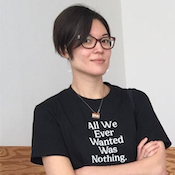
Mia Kang is a poet and art historian working across research, writing, and performance. She holds an M.A. in the history of art from Yale University, where she is completing her Ph.D. Her research focuses on the contested rise of U.S. multiculturalism and its unresolved legacies. Recent publications include contributions to Roxy Paine: The Dioramas (Skira, 2021), The Life and Times of Alvin Baltrop (Skira, 2019), Sanford Biggers: Codeswitch (Yale University Press, 2020), Published by Lugemik: Printed Matter from 2010-2019 (Lugemik, 2019), and Plot magazine. Formerly a Mellon Mays Undergraduate Fellow, she teaches as a lecturer at Yale College and Hunter College, CUNY, her alma mater.
Mia has also published widely as a poet. She is the author of the pamphlet City Poems (ignitionpress, 2020), and she was named the 2017 winner of Boston Review’s Annual Poetry Contest. Her poetry has appeared in journals including POETRY, Pleiades, Poetry Northwest, and PEN America. She has received awards from the Academy of American Poets, the Fine Arts Work Center in Provincetown, and the Millay Colony for the Arts. Her current poetics/performance project, “Theresa, I Miss You,” is dedicated to Theresa Hak Kyung Cha.
Simeon Marsalis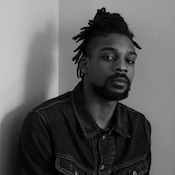
Simeon Marsalis is a writer from New Rochelle, NY, who earned an M.F.A. in 2019 from Rutgers University-Newark, where he is currently a part-time lecturer. His first novel, As Lie Is to Grin, was published by Catapult in 2017 and was shortlisted by the Center for Fiction for the first novel prize. His essay “Why Jazz: A Music Festival Review”, was published on Catapult.Co in the same year. He wrote a screenplay for NJpac’s “City Verses” project entitled Echoes of The Lion, which will debut in 2021. His short story, “The Dryer”, is forthcoming in KARMA Galleries’ Reading at Karma Magazine. Another story, “The Exterminator”, will appear in the Fall 2021 Founder’s Issue of Lampblack, a magazine and literary organization he helped co-found. Marsalis is currently at work on his second novel, End Times.
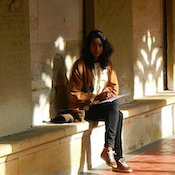
Tara Menon
Tara Menon focuses, in her research and teaching, on problems of religion, experience, and secularization in the European and Indian traditions. She has held fellowships at Jawaharlal Nehru University in New Delhi and the Ecole des Hautes Etudes en Sciences Sociales in Paris.
Iris Moon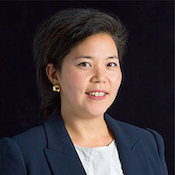
Iris Moon is an assistant curator of European ceramics and glass at the Metropolitan Museum of Art. Her research on the history and theory of European decorative arts and architecture has been supported by the Met, the Clark Art Institute and the Getty Research Institute. Alongside curatorial work at The Met, where she recently participated in the reinstallation of the British Galleries, she teaches at The Cooper Union. She is co-editor with Richard Taws of Time, Media, and Visuality in Post-Revolutionary France (2021) and is the author of Percier and Fontaine and the Struggle for Sovereignty in Revolutionary France (2016). A new book, Luxury after the Terror, is forthcoming with Penn State Press. She earned her BA at Williams College and her PhD at Massachusetts Institute of Technology.
Rose Ojo-Ajayi 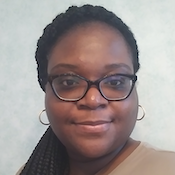
Rose Ojo-Ajayi is an artist, writer, educator, and historian whose work is primarily based in Comparative African Diaspora history, with a focus on the production of visual art created in African American, Black British and West African societies. Her research is also centered on social movements during the 20th and 21st centuries that includes the Black Power/ Black Arts Movements in the United States and Britain as well as the Independence period of West African nations.
Rose earned her Ph.D. from The School of Oriental and African Studies (SOAS), University of London in 2016. Her doctoral thesis is on migration and the assertion of African Diasporic identities in the work of artists of African descent based in the United States and Britain in the photographic work of Carrie Mae Weems, Joy Gregory, Albert Chong, Renee Cox, Rotimi Fani-Kayode, and Yinka Shonibare.
Rose Ojo-Ajayi has also written text-based works as a collaborative project with visual artists along with writing for publications such as the Studio Museum in Harlem’s STUDIO magazine, curating and co-curating exhibitions that feature the work of artists of African descent in New York City and London, UK. Currently she is investigating the representation of Black American and Black British identities in the contemporary work of first and second-generation African immigrant artists.
Harold Ramdass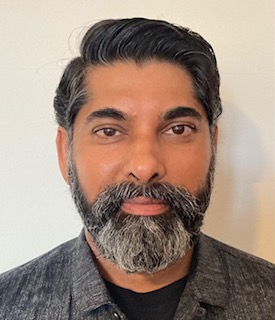
Harold N. Ramdass earned his B.A. from Baruch College, CUNY, and his Ph.D. from Princeton University. An Early Modern specialist by training, he has taught across various fields and has extensive writing center experience. At Cooper, he specializes in HSS 1, 2 & 4 and created courses on Caribbean societies and on the Fairy Tale. In Fall 2019, he and his class created the inaugural edition of Heads & Tales, an anthology of original student-created fairy tales and illustrations in print and digital formats.
Malcolm Rio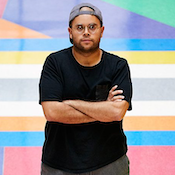
Malcolm Rio (he/they) is a graphic and architectural designer and thinker who is currently an Assistant Professor in the Department of Architecture at the Rhode Island School of Design (RISD) as well as a Ph.D. student at Columbia University in the Department of Architectural History and Theory. Their primary research focuses on the intersections of race, sexuality, kinship, and the empire in the 18th,19th, and 20th centuries. Rio received their Master of Science in Architecture Studies (SMArchS) from the Massachusetts Institute of Technology and was awarded the 2019 SMArchS Thesis Prize and the Arthur Rotch Special Prize for their research on the urbanism of house-ballroom culture in New York City, titled ”Drag Hinge: “Reading” the Scales Between Architecture and Urbanism” (2019). Rio also hold a Master of Architecture from RISD and a Bachelor’s degree in philosophy as well as a B.F.A. from Towson University. Between 2015 to 2017, Rio served as one of the inaugural AICAD Post-Graduate Teaching Fellows where they taught seminars and studios in foundations, graphic design, and architecture at the Maryland Institute College of Art. Their scholarship, criticism, and interviews have appeared in Thresholds, Avery Review, The New York Review of Architecture, ArchitectureMPS, and Pidgin, as well as within forthcoming books, such as a volume on sexuality, gender, and architecture titled Living Room being edited by Sophie Hochhäusl.
Ricardo Rivera 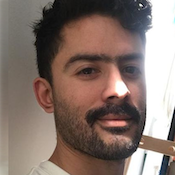
Ricardo Rivera is a Ph.D. student in Anthropology at the University of California, Berkeley, and earned a B.A. and M.A. in Linguistics at the University of Chicago. His dissertation, titled In the Aftermath of Empire: Memory, Time, and History in Adjara, Georgia, analyzes the forms that historical memory takes in everyday cultural practices in Adjara, an autonomous region of the Republic of Georgia. His research, funded by the National Science Foundation, focuses in particular on the legacy of this region’s history as a frontier province of the Ottoman Empire. His broader research and teaching interests focus on time and temporality, notions of historical rupture and continuity, and the construction of memory through language and narrative.
Sadia Shirazi
Sadia Shirazi is an art historian, architect and independent curator. She is currently a 2021-2022 ACLS Emerging Voices Postdoctoral Fellow at Johns Hopkins University. Shirazi was the Instructor for Curatorial Studies at the Whitney Museum of American Art’s Independent Study Program from 2018-2021 and has taught at Cornell, The Cooper Union, The New School and National College of the Arts. She has presented her work widely including at the Whitney Museum of American Art, King’s College, Cambridge University, New York University, The Palestinian Museum, the Sharjah March Meeting, and Lahore University of Management Sciences. Shirazi has published extensively and contributed to exhibition catalogues, edited volumes and peer-reviewed journals. She has curated exhibitions internationally including Soft and Wet at Elizabeth Foundation for the Arts, Project Space (New York, 2019) and the traveling Exhibition Without Objects at Khoj International Artists’ Association and The Drawing Room Gallery (New Delhi, 2013; Lahore, 2012). Her work has been shown at the 16th Venice Architecture Biennale, Performance Space New York and the Devi Art Foundation in New Delhi. Shirazi recently earned her PhD in the Department of the History of Art and Visual Studies at Cornell University and holds a Master of Architecture from the Massachusetts Institute of Technology.
Avra Spector
Avra Spector teaches literature and humanities courses at The Cooper Union and Baruch College, CUNY. She is a Ph.D. candidate in Comparative Literature at The Graduate Center, CUNY and holds an M.A. in Philosophy from University College Dublin and an M.F.A. from California College of the Arts. Her work investigates translation and silence in 20th century literature, and her writing has appeared in journals such as Lana Turner and The Capilano Review.




